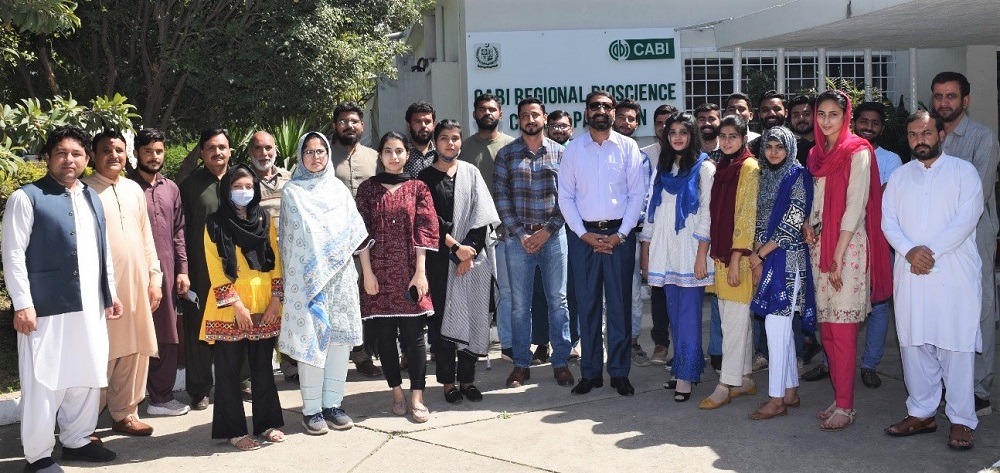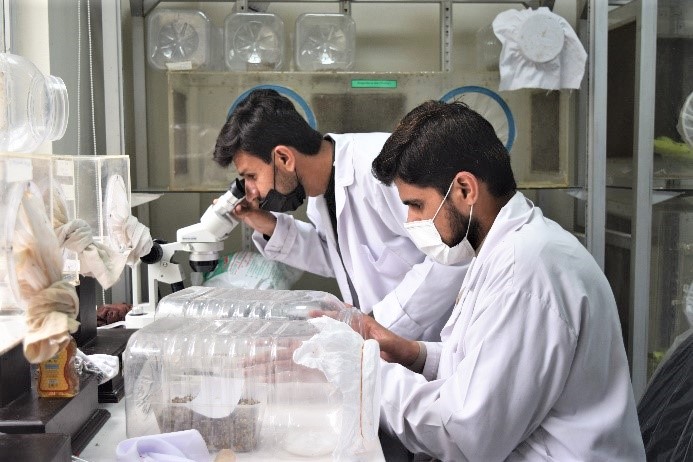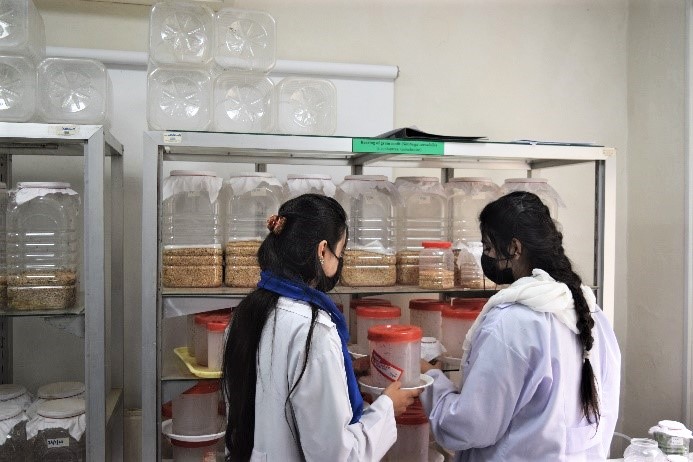
CABI in Pakistan has welcomed Bachelor’s and Master’s degree students from the country’s leading agricultural universities as part of an internship programme which provides the opportunity to sample projects and activities at the regional centre in Rawalpindi.
Twenty-five students from different disciplines of agriculture are being given the chance as part of the spring internship to learn about research at CABI in Pakistan’s state-of-the-art biological control laboratories and IPPC Level 2 quarantine facility.
This includes understanding more about how to manage invasive and quarantine insect pests – which can cause devastating impacts on the yields and profits of smallholder farmers – using safer-to-use and more environmentally friendly biological controls.
Under field trials, the students – from the University of Agriculture Faisalabad, PMAS-ARID University Rawalpindi and Quaid e Azam University Islamabad – are able to witness the practical implementation of pest surveillance, scouting, population’s dynamics, diseases indices and also take part in capacity building sessions to increase their knowledge of Integrated Pest Management (IPM).
The students are also being provided with a taste of insect collection methods and their preservation techniques at the national insect repository which is managed by the CABI Regional Bioscience Centre in Pakistan. The opportunity will help the internee students have a resourceful practical knowledge which they will assist them in their professional life beyond their university studies.

One of the students reported that before joining the internship at CABI she thought using a biological approach for insect pest management in Pakistan would be a difficult task. However, so far, her time at CABI has taught her mass rearing techniques of parasitoids and their release in the field.
Another student, from the University of Agriculture Faisalabad, highlighted that CABI’s platform is playing an important role in developing his skills and he is applying the knowledge he has learned during his course work.
He believes that at the conclusion of his internship he will be a better version of himself where he can deliver at entry level position in his career and contribute for the betterment of the agriculture sector of Pakistan.
Dr Muzammil Farooq, coordinator for the internship programme, highlighted that CABI is providing the students with exposure to different CABI themes by rotating them in different projects. “This will be helpful for students to gain experience for professional and personal growth,” he said.

While sharing his views with internees, Dr Babar Bajwa, Senior Regional Director Asia, said that 63% of the country’s population comprises of youth. “It’s a good sign that our young students are actively taking part in the development of the agriculture sector by learning advanced techniques,” he said.
Dr Bajwa added that in the past few years, the pandemics such as the desert locust crisis, climate change and COVID-19 have adversely impacted upon the food security of the region.
Dr Bajwa said, “To address these issues, scientists need to learn evidence-driven systems to help manage and predict devastating outbreaks to help our farming communities mitigate the risks to their crops and livelihoods.
“CABI will continue to build such collaborations with academia for the hands-on training of young scientists so that young scientists can play their part in addressing the various crop issues that put food security at risk.”
Additional information
Main image: group photo of internee students with Dr Babar Bajwa, Senior Regional Director, Asia (Credit: CABI).
Authors:
Dr Umair Safdar – Development Communication Executive
Saqib Ali – Communication Officer
Contributors:
Dr Muzammil Farooq – Project Manager
Mr Fazal Ullah – In charge Biological Control Laboratories
For more information, please contact:
Deputy Director Programme
+92 (0) 336 5133673
2 Comments
Leave a Reply
Related News & Blogs
Tripartite collaboration highlights sustainable biological control to fight crop pests in China and South-East Asia
The power of tripartite collaboration has been highlighted at a workshop focused on sustainable biological control and Integrated Pest Management (IPM) to fight a range of major crop pests in China and South-East Asia, particularly Malaysia. CABI, the…
22 January 2025





Is cabi gives stipend to internee?
I want to enroll as an intern at Cabi. Do you have vacancies now?